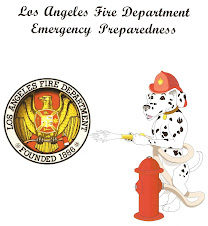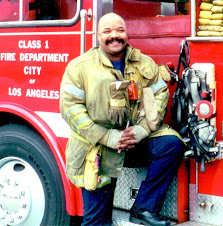Recently, I returned home from a family reunion held in Milwaukee, Wisconsin. The event was wonderful, but a byproduct of being a firefighter is that even off duty, my firefighter, disaster preparedness brain is on. This is a good thing because if we train ourselves, our families and our neighbors to always be aware, be observant, anticipate and articulate what “the plan” is, we are on the way to truly being a safer Los Angeles. The following is a quick ten minute safety walk through I did with my son when we checked into our hotel.
AWARE- Be aware of the region you are in and what are the potential disaster scenarios you can reasonably anticipate. I was in the mid west during the Fourth of July weekend. Some of the common events that the Milwaukee, Chicago areas have experienced is flash floods, tornados and thunder storms. While I did not belabor these thoughts, I did run through my mind a coupled of “what ifs”. What if while at the picnic, there was a sudden thunder storm? What is the forecasted weather condition for our stay? Where is the local hospital if something happens? (I found an urgent care four miles south of our hotel) By having run through these thoughts prior to any emergencies, I felt a great sense of empowerment. (The one thing that kills fear is knowledge.)
OBSERVANT- One of the wonderful things about our country is most cities, counties, municipalities and jurisdictions have a fire code. These fire codes are what require motels, hotels, public assemblies and other places to have proper exit signs, fire extinguishers, and other emergency information posted for everybody to see. Take the time to walk through your hotel and see the exits. If you are out at night, are the exit signs illuminated? Take the fire escape at least once. It makes for good exercise, but you also insure that the routes are clear and are not being used for storage. Has the extinguisher near your room been serviced recently as well as properly charged? Often, on each floor near the elevator doors, there are signs that report the closest exit and sometimes an alternative exit route.
ANTICIPATE- This is in line with the “what if” questions. I anticipate somebody getting sick or injured. I travel with some simple medications such as aspirin, cold & flu medicine (I have a 4 year old and a 9 year old, so I include pediatric medication), cough drops, allergy medication, antacid, nausea/diarrhea medication. Rarely do we feel sick during business hours. Often the feeling of sickness hits at 2:00 AM when the local drug store is closed. This bag of medication can go into your family disaster supplies when you return home. Have extra copies of medical insurance cards as well as a copy of each traveling member’s medical history. A hard copy is preferred, but if you scan all of these items to a USB drive, you can make a spare copy to keep in your luggage, so no matter where you are in the world, you can have a complete set of your documents with you.
ARTICULATE- Share this information with your family. As you can see in my pictures, my son was an active participant is my safety walk through. I had him point to specific items so that not only did he feel he was apart of the family, but he was also apart of the team. His pride in being able to “show mommy the safe way to get out” is as special of a memory as meeting his cousins at the family reunion. The first night, take the whole family for a “ten minute tour” of your accommodations. This not only points out vacation essentials like the day spa, Jacuzzi, pool and gym, but it confirms the location of exits, emergency lighting, fire extinguishers, food and beverage vending machines and ice. Make sure everybody is informed.
Disaster can happen at any time and while a vacation is our time to relax, it is also our time to “stay ready”.
Thursday, July 9, 2009
Subscribe to:
Post Comments (Atom)










No comments:
Post a Comment